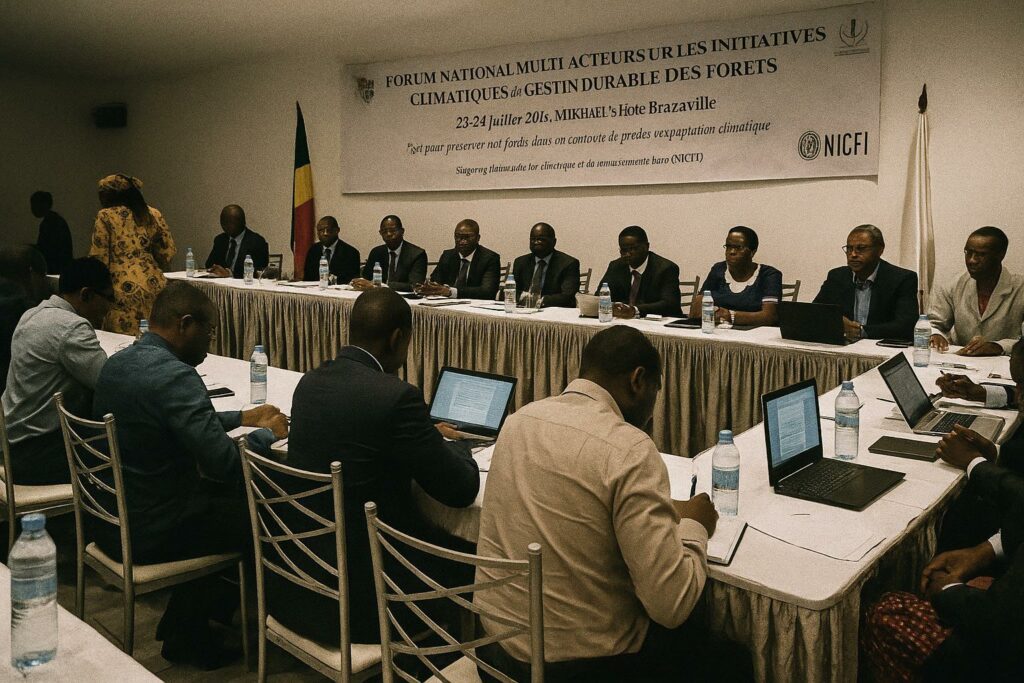Forest Governance in the Congo Basin under International Scrutiny
Few biomes capture the diplomatic imagination quite like the Congo Basin, a carbon sink second only to the Amazon. Yet the Basin is also an arena where corporate concessions and fragile institutions intersect. During the Brazzaville forum on climate initiatives and sustainable forest management, thirty participants from government, civil society, indigenous communities and the private sector scrutinised the country’s environmental stewardship. The meeting, financed by the United Kingdom with technical input from the NGO Fern, unfolded against the backdrop of fresh data suggesting that the Republic of Congo lost nearly 100,000 hectares of tree cover in 2022 alone (Global Forest Watch 2023).
Corporate Footprint and the Imperative of Regulation
Timber giants and mining conglomerates hold concessions that cumulatively exceed the size of South Korea. Their operational codes are shaped by a mosaic of decrees dating back to the 2000 Forest Law, a text many analysts now deem obsolete. Forum delegates therefore called for the ‘recadrage’ of corporate behaviour—an explicit demand for firmer legal teeth rather than voluntary guidelines. According to a recent World Bank diagnostic, only 15 percent of Congo’s industrial logging concessions are currently certified by credible third-party schemes (World Bank 2022). The gap between de jure commitments and de facto enforcement has become diplomatically embarrassing for a government positioning itself as a guardian of the world’s “second lung.”
The Legal Patchwork: From APV FLEGT to a Draft Wildlife Law
At the core of the recommendations lies an insistence on accelerating the adoption of the Draft Law on Wildlife and Protected Areas. The text, stalled in parliamentary committees for nearly two years, would modernise penalty scales and enshrine free, prior and informed consent from local communities. Parallel debates revolve around revising the legality grid under the Voluntary Partnership Agreement of the EU’s FLEGT mechanism, an instrument originally lauded as transformational yet now criticised for procedural opacity (European Commission 2023). By urging ‘rapid execution’ of legislative processes, forum participants implicitly acknowledged that the country’s accession to international timber markets could falter if Brussels perceives regulatory lethargy.
Voices of Communities and Indigenous Peoples in Sustainable Forestry
Perhaps the forum’s most resonant intervention came from an elder of the Mbendjele-BaYaka people, who reminded delegates that subsistence hunting remains both a livelihood and a cultural anchor. His plea echoed findings by the Center for International Forestry Research, which argues that indigenous land rights correlate strongly with lower deforestation rates (CIFOR 2021). The proposed framework for ‘cadres de concertation’ at concession level seeks to institutionalise such voices. Yet without budgeted mechanisms for conflict resolution, these platforms risk degenerating into token consultative rituals.
Economic Stakes versus Ecological Limits: Weighing Timber, Mining and Carbon Markets
Balancing fiscal imperatives with ecological limits remains the perennial challenge. Forestry and mining account for roughly 15 percent of Congo’s GDP and a quarter of export revenue, figures the Ministry of Economy is reluctant to jeopardise. Nonetheless, donor appetites for carbon credits create new incentives. Norway’s US$150 million Letter of Intent with Gabon, often cited as a benchmark, looms large in Brazzaville’s calculations. Government technocrats are exploring a similar results-based payment scheme, yet investors insist on ‘high-integrity’ baselines—code for demonstrable enforcement against illegal logging (UN-REDD 2023). Thus, regulatory procrastination could translate into foregone climate finance.
Navigating External Financing and Donor Conditionalities
British funding for the Brazzaville forum is emblematic of a wider trend: environmental assistance increasingly arrives tethered to governance benchmarks. In a conversation on the margins, a senior official from the Foreign, Commonwealth & Development Office stressed that “credible parliamentary timelines” for the wildlife bill would influence the next tranche of UK aid. Similar conditionalities feature in the African Development Bank’s forthcoming Green Growth Program. Far from mere technocratic niceties, billable milestones now carry the weight of diplomatic currency.
A Diplomatic Test for Brazzaville and its Partners
The forum ended on an optimistic note, yet optimism devoid of enforcement risks eroding Congo’s international standing. President Denis Sassou Nguesso will soon host the Three Basins Summit, a geopolitical stage where pledges face forensic scrutiny. Should Brazzaville fail to pass its wildlife law or to revamp its FLEGT grid, interlocutors in Paris, Oslo and Washington may recalibrate their climate partnerships. Conversely, a demonstrable clampdown on corporate malpractice would bolster Congo’s bid to monetise ecosystem services while safeguarding ecological integrity. The weeks ahead will reveal whether the government can translate earnest statements into legally binding guardrails, thereby proving that Congo’s timber titans can indeed be tamed.

